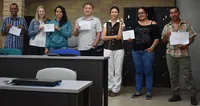The aim of the project was to develop and evaluate an interactive tablet textbook on fractions that includes all the functions of a traditional textbook, such as reference facts, explanations and exercises, but also specifically incorporates the interactive possibilities of the tablet to make abstract concepts haptic.
The project examines the diagnostic processes of teachers in a task-based simulation. Accurate diagnoses are necessary to enable support measures and adaptive teaching. The project aims to contribute to describing diagnostic processes among prospective and practicing teachers at a high resolution level.

This project investigates the role of individual and task-related characteristics on the quality and process of judgments about mathematics tasks made by individuals with different knowledge and experience. In addition to verbal expressions, eye movements are recorded using eye-tracking technology. The results could provide insights for targeted measures to promote diagnostic competencies in teacher education and professional development.
The project investigates the influence of situational characteristics on the diagnostic judgment processes of teachers regarding misconceptions in the area of fractions. Information from student solutions and subject-specific knowledge is used, and the information processing is influenced by episodic experiences and time pressure. The judgment processes are captured through thinking aloud and eye-tracking.
The FracVisET project investigates different types of visualizations for fractions and their suitability for supporting students in building size representations for fractions. Eye-tracking is used to measure eye movements and allow inferences about cognitive processing.
Mathematics anxiety (MA) impacts performance and consists of trait (general) and state (situational) components. This project uses both self-reports and physiological measures to investigating the relationship between state MA and processing efficiency in mathematical tasks, aiming to validate physiological measures for real-time assessment of state MA.
The "MeMoMa" project was a cooperation between the TUM School of Education and the Faculty of Mechanical Engineering. The project investigated the interaction between cognitive and affective characteristics of students and their understanding of complex machines in engineering. The aim was to efficiently capture discipline-specific mental models and to examine the development of characteristics and understanding over the course of their studies. Differences between experts and novices, as well as between experts of different disciplines, were also examined.




